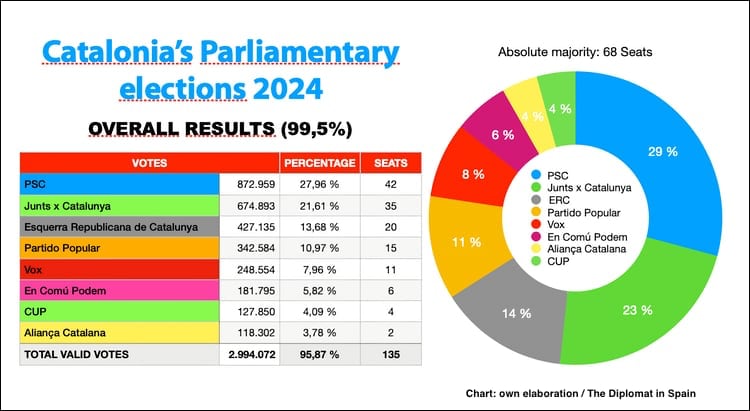The Diplomat
The Socialist Party of Catalonia (PSC) won a comfortable victory in the Catalan parliamentary elections yesterday, but will need to make a pact with other political forces in order for the socialist candidate, Salvador Illa, to be able to govern.
The most likely option, according to analysts, is the formation of a left-wing tripartite, led by the PSC, with Esquerra Republicana de Catalunya (ERC) and En Comú Podem – the electoral brand of Sumar in Catalonia – which would win an absolute majority in the Catalan Parliament.
The Socialists have won 42 of the 135 seats that make up the regional chamber, where 68 seats are needed for an absolute majority. This is a number that the PSC can achieve if, as seems likely, it reaches an agreement with ERC (20 MPs) and En Comú Podem (6) to form a government.
However, any option will depend on the decision taken by the ‘republicans’ (ERC). The current ‘president’ Pere Aragonés, although it seems unlikely, could also opt for a repeat election instead of supporting the PSC. But, in that case, all analysts agree that Esquerra Republicana would not improve its results, which have been a severe blow to the current ‘Govern’, and would be committing political suicide.
Although Carles Puigdemont’s party, Junts per Catalunya, was the second most voted and has 35 representatives in the Catalan parliament, its chances of forming a government are slim if, as seems likely, ERC opts for an agreement with the PSC to invest Salvador Illa as ‘president’. Puigdemont insisted yesterday that if ERC does not support him, should at least abstain to allow him to become president.
Puigdemont’s chances of forming a government are seriously hampered by the fact that the other two pro-independence parties – the CUP and Aliança Catalana – have only won four and two seats respectively. Even in the hypothesis that ERC and the ‘commons’ decided to support the fugitive ex-president, which is highly unlikely, he would only manage to win 67 seats, which would not give him an absolute majority in the new ‘Parliament’.
The results, according to experts, are an endorsement of Spanish Prime Minister Pedro Sánchez’s policies on Catalonia. But they also open up a new national political scenario if, as it seems, Puigdemont decides to withdraw support for Sánchez from his seven MPs in Congress. That, in turn, would give the prime minister the possibility of calling new general elections, according to some analysts.
On the other hand, the results of the constitutionalist right parties have been remarkably good and have contributed to the fact that for the first time since 2015 there is no pro-independence majority in the Catalan Parliament. The People`s Party has multiplied by five the three MPs it had, reaching 15. Vox, for its part, has maintained the 11 MPs elected in 2021. In spite of everything, neither of these two parties will, in principle, have any weight in the negotiations to form the new ‘Govern’.
The novelty of these elections is the entry into the regional legislative chamber of Aliança Catalana, a far-right, Hispanophobic and Islamophobic pro-independence party founded by the current mayor of Ripoll, Silvia Orriols.






